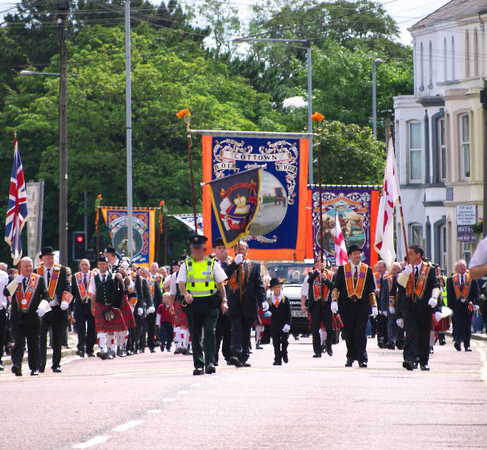Disclaimer: The views and opinions expressed in this article are those of the author and do not necessarily reflect the official policy or position of The History Press.

'Northern Ireland is a country that is rich in culture, history and the ‘Craíc’ (Pronounced ‘Crack’…having a good time). Since the ‘Good Friday Agreement’ of 1998 which ended thirty years of bloodshed the ‘Craíc’ has been on a continuing upward spiral. Belfast, the capital, now has a young, vibrant population, with a good night life, pleasant restaurants and cinemas and excellent links to the rest of the country. The city centre on any given day is a bustling hive of activity, smiling people and buskers.
Belfast is also a city of contrasts. History is lived in this city, from the murals commemorating the ‘Troubles’ on the walls of the Falls and Shankill Roads to the yearly commemorations and marches that quite literally bring the city to a standstill. One such march, occurring on or around the 12th July, is the annual Protestant commemoration of the defeat of the Catholic King James by his Protestant son-in-law, William of Orange. Various Orange Lodges in Belfast partake in this, and the marches have historically been a source of conflict and aggravation with Catholics for decades.
The Parades Commission has, every year, the unenviable task of trying to placate both sides. The Protestants argue that they shouldn't be able to march anywhere on the ‘Queens Highway’, the Catholics request that they don’t march through their areas. Considering that the marches mark a Catholic defeat and that many Catholics view them as antagonistic, one could be forgiven for at least understanding their point of view. But it’s not as simple as that.
Protestants, on the other hand, see the marches as a celebration of their culture, for so long vilified by parts of the Catholic community, and therefore feel their right to march where they want is sacrosanct. They regard any interference in the routes as an attempt to erode another aspect of their identity. On many occasions in the past fifteen years arguments and debates have mostly led to an increase in street violence, putting Belfast in the spotlight for all the wrong reasons again.
Who wins? Alas within this arena there are no winners. Everybody is wrong and everybody is right. History has shown that to be the case down the generations. That is why history is lived every day in this city the ‘Troubles’ have left a long shadow.'
ANDREW WALSH was born in Birmingham of Irish parents, but moved to Drogheda in Ireland when he was five. He grew up in the shadow of the Troubles and was acutely aware of the impact both Catholics and Protestants had on Irish society. Walsh moved back to England in 1991, and completed a history degree. He has dedicated the last four years researching and interviewing those involved in the Falls curfew and has had unprecedented access to the families and to the political parties involved, including Sinn Fein. he is the author of 'From Hope to Hatred: The Falls Curfew and Catholic Alienation'. For more on the Irish 'Troubles' and the Falls Curfew, please click here.